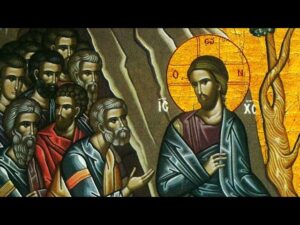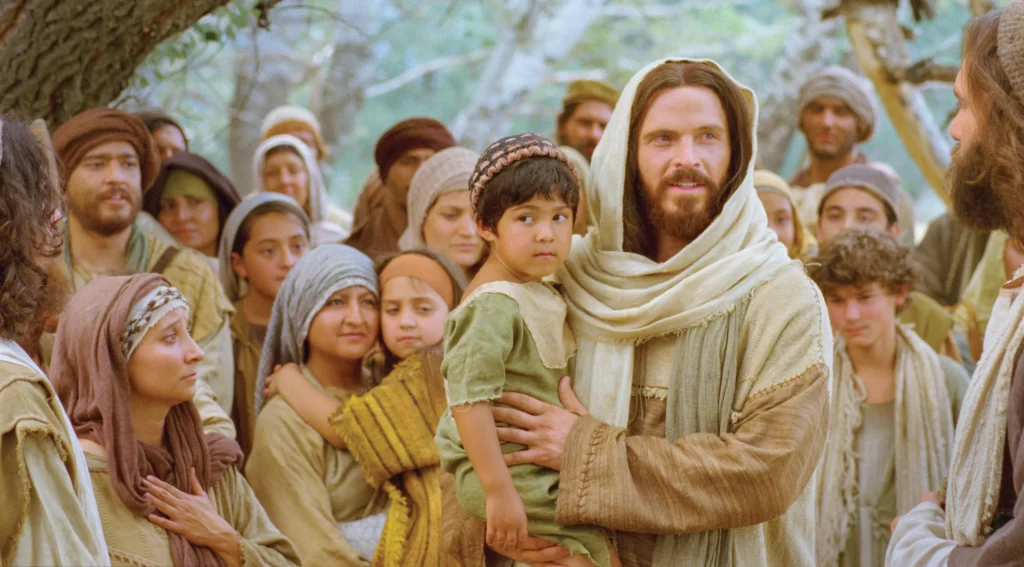Becoming Like Little Children
33 They came to Capernaum; and when He was in the house, He began to question them: “What were you discussing on the way?” 34 But they kept silent, for on the way they had discussed with one another which of them was the greatest. 35 And sitting down, He called the twelve and said to them, “If anyone wants to be first, he shall be last of all and servant of all.” 36 And He took a child and placed him among them, and taking him in His arms, He said to them, 37 “Whoever receives one child like this in My name receives Me; and whoever receives Me does not receive Me, but Him who sent Me.”
38 John said to Him, “Teacher, we saw someone casting out demons in Your name, and we tried to prevent him because he was not following us.” 39 But Jesus said, “Do not hinder him, for there is no one who will perform a miracle in My name, and be able soon afterward to speak evil of Me. 40 For the one who is not against us is for us. 41 For whoever gives you a cup of water to drink because of your name as followers of Christ, truly I say to you, he shall by no means lose his reward.
Dire Warnings
42 “Whoever causes one of these little ones who believe in Me to stumble, it is better for him if a heavy millstone is hung around his neck and he is thrown into the sea. 43 And if your hand causes you to sin, cut it off; it is better for you to enter life maimed, than, having your two hands, to go into hell, into the unquenchable fire. 45 And if your foot is causing you to sin, cut it off; it is better for you to enter life without a foot, than, having your two feet, to be thrown into hell. 47 And if your eye is causing you to sin, throw it away; it is better for you to enter the kingdom of God with one eye, than, having two eyes, to be thrown into hell, 48 where their worm does not die, and the fire is not extinguished. 49 For everyone will be salted with fire. 50 Salt is good; but if the salt becomes unsalty, with what will you make it salty again? Have salt in yourselves, and be at peace with one another.”
Connecting the Dots
At first read, we might think that in Mark’s writing he is jumping from one teaching to another and they are not connected. And I used to read scripture like that. I just thought that that is how it is written. I don’t agree with that too much anymore. If I look I will often find a thread or a pattern or a theme or a chronology or some important idea that is linking everything together. An often there is more than one idea going on. I compare it to a tapestry. If we only look up close then all we see is the different yarns used. But when we step back we can see the design and the weaver’s intent and story woven into their work. Each lesson seems like a different yarn but they are all woven together to help us see a bigger theme that exists in life and how our creator would like for us to understand what we’re looking at.
From Our Discussion
This passage was what we looked at last night in our Wednesday night discussion. Some of the ideas that we looked at were.
- What does it mean to be “against” Jesus?
- Did Jesus have “enemies”?
- Our tribalistic nature as humans
- How do we become children again?
- What it might mean to do something “in the name of Jesus”?
- What does it mean to cause someone to “stumble”?
- The eternal nature of our good deeds
- We are the cause of our sin not our circumstances
As always there were so many great comments made that brought this passage to life and my “meeting minutes” will not do it justice. But I still find it a good thing to capture the concepts we explored.
Whoever Is Not Against Us Is For Us
A phrase that has become more popular today spoken in the reverse order. “If you’re not for me you’re against me”. Politicians and coaches love this phrase. Jesus’ use of this is a more benign version of the sentiment. But I think that he also very powerfully shows us that he does not have enemies. There are those that see Him as an enemy but that is a unilateral perspective. It doesn’t make sense for Jesus to tell us to love our enemies and while he actively fosters adversarial relationships with people who don’t agree with Him.
Tribalism

Webster’s defines tribalism as being derogatory and exalting the tribe above other groups. Perhaps we might credit Mark with connecting the idea of establishing a pecking order among themselves with tribalism. Once our identity comes from the group we are a part of then knowing where we stand within that group is crucial to how much power we have. The disciples become so focused on that, that they fail to see God working right in front of them because God is not a part of anyone’s group! So when they come across a stranger doing what they feel is exclusively theirs, it challenges them. This person is not a part of their group and doesn’t fit into their established pecking order. Rather than allowing this discovery about God to shape their understanding, they want to cover it up because it’s Their silence says all that needs to be said.
Become like one of these little ones
Mark’s point is that the non-follower, the non “churched”, is like the little child that we all need to become like. God chose to work through this man and this man recognized that. He took no credit and rather gave the credit to Jesus and kept it that simple. He wasn’t caught up in all that we might be tempted to get caught up in today. Things like where we go to church. What our church teaches and believes. Titles and recognition we strive for within our church communities. He kept his faith simple by doing what he saw Jesus doing and giving all the credit to God. That is perhaps becoming like a child.

Jesus point that they wouldn’t be that upset if he did something simple like give a cup of water to them, points to what is really going on. Because they are following Jesus, they mistakenly believe that they can define the boundaries within which God will work. They wrongly believed, “God may prompt non-followers to do good deeds, but He will not work miracles through them”. Jesus recognizes the Pharaseecal shortsightedness of their actions and shines the light on it.
Something eternal
Jesus says something a little unexpected in response to their telling this stranger to stop. He says that no one doing a miracle in his name will be able to soon after say something bad about Him. He then returns to the idea of a simple act of kindness being eternally rewarded. Jesus is pointing us to the eternal nature of our good deeds. Often times we let our good deeds be overshadowed by our sinful choices. Jesus reassures us that the good we do in His name cannot be undone.
Sin from within
Jesus directs his disciples to look within themselves and understand the seriousness of what they just did. Here is a guy that is happily doing the work of the Father, unhindered by the fetters that organized religion comes with. And they got in his way. It didn’t fit their understanding of God. It was rogue and out of their control. They wanted it to stop. They demanded that a man who God was using to bring healing to others, stop! This man, like a little child, may have felt foolish and inappropriate because of their chidings. He may have never returned to allowing God to use him again. Jesus says to his disciples, if that is the case, it is on you! It is coming from within you, your hand, your foot, your eye!
How radical it would be if we who call ourselves Christ’s followers, could learn to see
